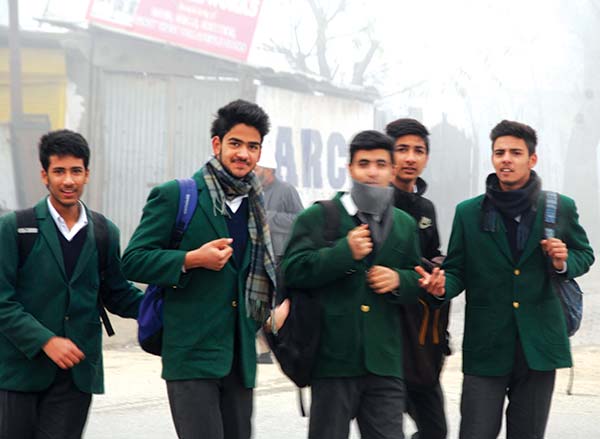Vagaries of winters have substantially reduced over the decades. But the new tools have created an unreal world around the façade of the virtual reality that is gradually taking a huge toll of the new generation, grandpas tell Shams Irfan
 Sitting in a corner of their grand living room, an amazed Sara, watches her granddaughter Zainab play on an ipad. For Sara, now in her late seventies, life has always been full of surprises and struggle. She spent her life in penury to raise five children after her husband died young. But what surprised her most is the technology.
Sitting in a corner of their grand living room, an amazed Sara, watches her granddaughter Zainab play on an ipad. For Sara, now in her late seventies, life has always been full of surprises and struggle. She spent her life in penury to raise five children after her husband died young. But what surprised her most is the technology.
Sitting in the same room Zainab, 7, has not spoken a single world to Sara in last two hours. “This generation is different,” says Sara. In my childhood kids used to wait for winters eagerly. Then, the sole source of entertainment for them was stories narrated by their grandparents.”
Ironically, technology has reversed roles for Sara and Zainab. After spending hours on her ipad, which was a gift from her father on her sixth birthday, Zainab sometimes finds time to sit down with her grandmother and talk. “She would tell me about the world. About new places, computers and about everything that I don’t know,” says Sara. “I wish I could tell her about what life was like in my childhood.”
Sara wants to tell Zainab how kids of her age used to sit around their grandparents and listen to stories of far off places, of tough times, of atrocities committed by despots, of hardship and pain, of great travellers and saints, of resistance and resilience, of faith and our culture and lot more. “But Zainab simply is uninterested,” says Sara painfully. “She lives in a different world. These kids have no time even for themselves.”
Mudasir Aziz, clinical psychologist, who is working as in-charge drug de-addiction center, Islamabad, feels that parents who give too much of personal space to their kids end up isolating them.
During winter vacations 15-year-old Alisha’s day starts at 6 am. The first thing she does is to check her Facebook, followed by a look at her Farmvilla score and then by surfing the net. After quick breakfast of sugar free biscuits and tea she rushes for her tuitions. She returns at noon. After lunch she visits another tuition center.
“I get to see her only in the evening,” says Alisha’s father Basit Ali, a city businessman who deals in Kashmiri handicrafts and spends his time between Srinagar and Delhi. “When I was a kid I used to visit my maternal grandfather’s house during winter vacation. It was lot of fun. All my cousins would be there,” remembers Basit. “It used to be a grand party that would last almost two months.”
But it has been three years since Basit’s daughter Alisha last visited her Matamaal in old town Srinagar. “She is busy with her studies,” defends Alisha’s mother Rifat. “This is crucial time of her career. Once she is a doctor she can visit whosoever she wants,” says Rifat with a ray of hope in her eyes. “Till then studies are more important.”
However, Mehnaz’s case is different. Despite her busy schedule and pressure from parents to score good grades, Mehnaz makes it a point to spend some quality time with her grandmother. “I eagerly wait for winter vacation when I get a few days for myself,” says Mehnaz, who is busy preparing for competitive exams this winter, “My parents want me to become a doctor, so visiting my grandparents this winter is impossible.” Literally, she is put under house arrest because she has to appear in CET next year. “My mother even serves me dinner in my room.”
Mehnaz’s grandmother is a grand old lady who loves to talk about her youth and beauty. She would tell Mehnaz how marriages were simple and sophisticated in good old days. “It is like being transported to that era. Nobody can match her storytelling skills. I simply love to spend time with her,” says Mehnaz.
Zeeshu is 11 and she is a curious case. She is the most sophisticated child among her cousins. “It is hard to impress this whizkid,” says her contractor father Rahil Ali, who has spent most of his childhood abroad.
Zeeshu loves spending most of her time in her Hana Montana themed bedroom and has met her grandparents barely twice since her birth. “She shuts herself in her room whenever they visit. It is odd but it’s her choice. We cannot force things on her,” says Ali.
Ayesha, her teacher mother, is a complete contrast. “I don’t know when and how she turned into a loner,” says Ayesha. “It is sad but she thinks that these people (grandparents) are illiterate and have no exposure of the world. Her parameters are different.”
Last winter Ayesha tried taking advantage of winter vacation and cold weather, to strike a bond with her daughter, but internet played a spoil sport. “She spent time on the net instead of talking to me,” says Ayesha. “Even during our childhood winter used to be main connector for scattered souls. But this generation is completely different. They love to live in their virtual worlds when nature outside the four walls keeps callings.”















